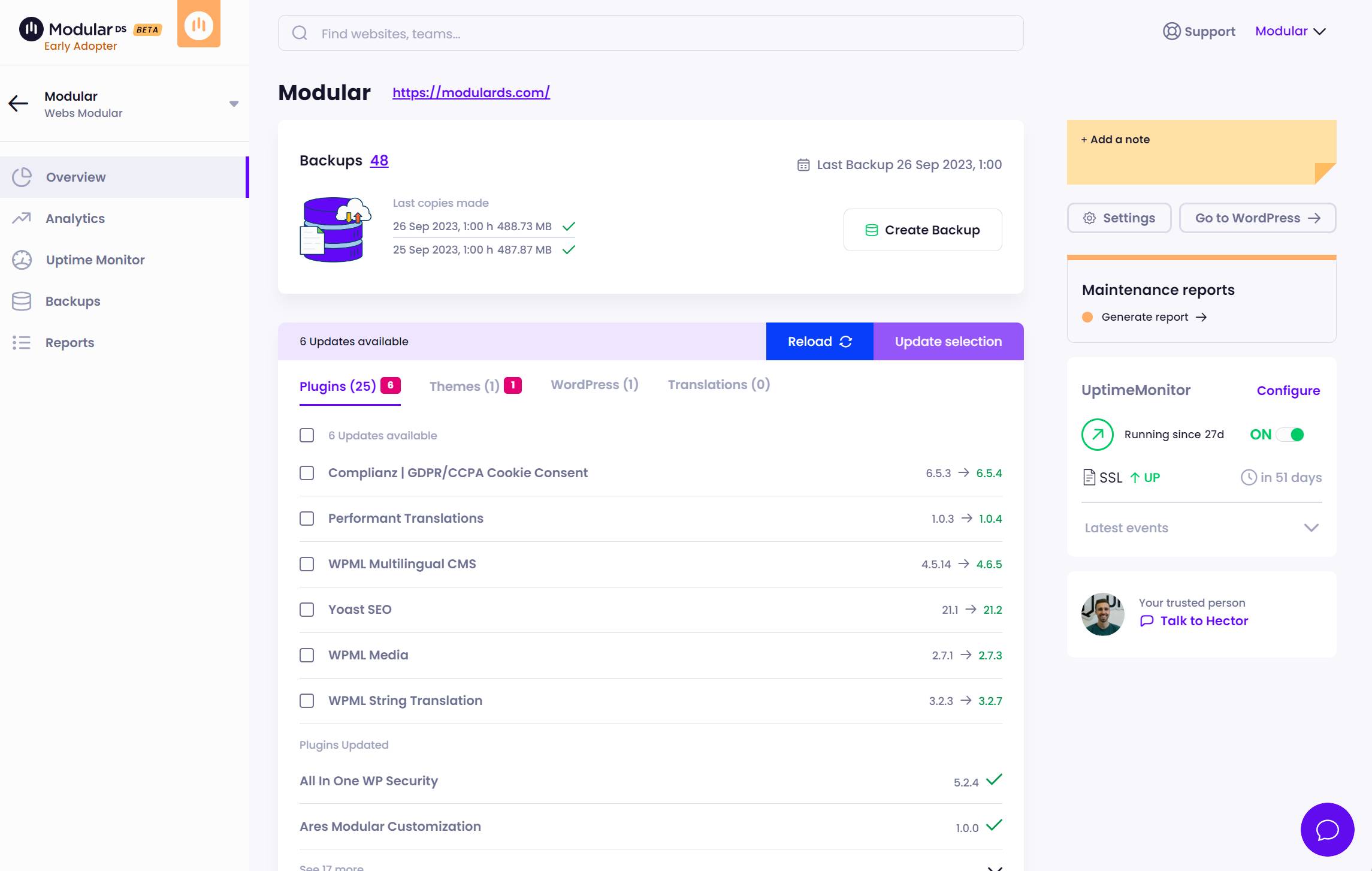The best alternatives to WordPress in 2023

Creating a website, blog, or online store with WordPress is the choice of the majority of companies and professionals worldwide. However, it’s not the only option, and the alternatives available are becoming increasingly interesting due to their power, versatility, and innovation.
WordPress currently powers over 40% of the published websites on the Internet. That’s quite impressive. However, these alternatives to WordPress that we will talk about are also growing significantly in the coming years, as they offer new options for efficiently tackling web projects, sometimes even faster or with functionalities that are not easy to find in the popular CMS.
Knowing the alternatives will allow you to choose the tool that best suits your way of working, thus increasing the profitability of your projects and the satisfaction of your clients.

Tabla de contenidos
Growth of CMS tools
WordPress was one of the first content management platforms or CMSs (Content Management Systems), and its adaptability to the needs of professionals quickly led it to dominate the market. There was a time when it seemed like the only alternative, but that’s no longer the case today, so keep an open mind to explore other options.
In 2020, more than 65% of websites created worldwide were built using a CMS platform. Many of them used WordPress, yes, but also these new platforms that are growing rapidly and deservedly so.
Most of these platforms are what we call no-code or low-code tools for creating websites without requiring extensive technical knowledge. They allow anyone to tackle professional projects, requiring only dedication, time, and learning how to use the selected platform.
Despite WordPress being the most well-known, an increasing number of people believe that these new applications are more powerful and easier to use than the famous open-source software.
That’s why we are going to take a look at the main alternatives available in the market:
1. Wix
Wix is a cloud-based website builder that made a significant breakthrough in the market thanks to an incredible promotional and advertising campaign across various digital channels, including television.
It is a very simple and intuitive tool that allows you to develop a website. It uses a drag-and-drop system that allows users to place different elements of the website wherever they want and resize them to adjust the design.
Since a couple of years ago, with its Editor X, it has a more advanced option for users looking for more customization.
Strengths of Wix:
- Agility: One of the great advantages of Wix is that it accelerates the entire web design and development process, allowing you to have a functional website in just a few hours of work.
- Ease of use: Wix is specially designed so that any user, even those who don’t specialize in web design, can use it without difficulty. The learning curve of this platform is very smooth, and no programming or web design knowledge is required. It even has an “Artificial Intelligence” system that creates a website based on a template according to your type of business.
- Availability of templates: Wix provides a wide range of pre-designed professional templates that users can use to speed up their web design and development process. These templates allow you to create a website instantly, and you only need to customize some aspects later on.
- Includes hosting: With Wix, you don’t have to worry about hosting because it is already incorporated into the service.
It is currently the leader among WordPress alternatives, although professionals often don’t use it due to its reputation for lower technical quality and performance (although it has improved a lot in this regard). It is perhaps more oriented towards end-users who dare to create their own website.
Cost: Free plan and paid upgrades starting from €4.50/month to €13/month.
2. Squarespace
This platform is especially focused on professionals and freelancers so that they can develop a professional website to offer their services through the internet.
Squarespace is a closed environment that does not depend on third-party plugins, something that limits it in some aspects but guarantees a compact and stable platform.
Strengths of Squarespace:
- User-friendly environment that facilitates the creation and placement of the different elements that make up a website.
- It does not require the hiring of a web hosting service provider.
- It does not use third-party plugins nor is it necessary to install any add-on that slows down the loading speed of the website.
- It takes special care in the design of its templates, which helps to quickly create web portals that are really attractive to users.
- It uses a drag and drop system that facilitates web creation for users without experience or technical knowledge.
Cost: Free plan and paid upgrades from €11/month to €36/month if you choose annual plans.
3. Webflow
Primarily aimed at professional designers, Webflow is one of the fastest growing tools in recent years. They have a very careful flow.
With a very powerful visual builder and the possibility of integrating with other types of non-code platforms, it allows you to create both basic websites and authentic digital cathedrals.
Strengths of Webflow:
- Its drag and drop visual editor, similar to Figma or even Photoshop, allows designers to quickly learn how it works.
- It has its own engine to create an eCommerce to sell products and services online.
- It allows multiple users to access and collaborate on the design in real time.
- It has a wide variety of templates to speed up the web development process.
Cost: Free plan and paid upgrades from $12/month to $36/month if annual plans are chosen.
4. Weebly
For all those who are looking for a codeless platform to develop a professional website for their company, Weebly offers the ideal environment. It is a very practical CMS that has been on the market for a long time and has not stopped improving and evolving to become one of the best tools for generating websites for companies and professionals.
Weebly’s strengths:
- It provides fast loading speed by optimising all aspects of the website such as code or images.
- Weebly’s editor is ideal for building a website organised by categories.
- It adapts to mobile devices such as tablets or smartphones, allowing users to use the website with a high level of usability and adaptability.
- It offers a selection of elegant and professional templates to give the website an attractive and original visual appearance.
- It is an SEO platform, i.e. it is optimised for Google and other search engines, making it easier to compete to appear in the top positions of the SERPs or results pages.
- It incorporates its own system that allows you to build an online shop.
- It has more than 300 add-ons in its App Center to optimise the website and add new and interesting functionalities.
Cost: Free plan and paid upgrades from €5/month to €20/month if paid annually.
5. Shopify
Shopify is one of the most complete platforms that exist to create an ecommerce and that is why many companies opt for this CMS that allows them to build a professional online shop in a short time and start offering products and services online.
It is not free like Woocommerce but its management is simpler and you have all the services you need in the same place, without depending on third-party plugins or integrations with specific payment gateways.
With Shopify, many tasks of creating and maintaining a sales website are automated so you have more time to focus on other tasks of greater value to your business, such as advertising and digital marketing, customer relations or stock management.
Shopify’s strengths:
- It has all the basic elements that an eCommerce should incorporate (shopping cart, advanced product sheets, cross-selling, shipping management, secure payment gateways…).
- It is compatible with the main existing payment gateways to offer users their favourite payment methods (Stripe, PayPal, bank cards, Apple Pay…).
- No need to worry about hosting as Shopify itself provides the storage space.
- It uses the simple and intuitive drag and drop system to build the online shop and has templates to choose from.
- It has digital marketing tools to boost the reach of the eCommerce so that it can reach more users and increase sales.
Cost: Free plan and paid upgrades ranging from €27/month to €289/month.
6. Bubble
One of the great appearances of the last few years in no-code platforms for the creation of apps and web pages is Bubble. It is a very visual tool that makes it easy for the user to create the basic elements of an app, placing them where they feel most appropriate, changing their size and assigning the custom functions they perform.
Creating an app without writing a single line of code is possible thanks to this application, making it one of the most interesting tools available today.
Strengths of Bubble:
- Its app design environment is really simple so it can be used by any user as it does not require previous technical knowledge.
- It allows you to place any element of the app in the desired location with a high degree of precision, which allows a high level of customisation.
- It has options to authorise access to other users, making it suitable for collaborative development projects.
- It has templates and plugins to add visual improvements and new functionalities.
Cost: Free plan and paid upgrades which, in the case of paying annually, range from $25/month to $475/month.
7. Joomla
Being the only one on the list that, like WordPress, is open source, we can say that Joomla has seen better days. In contrast to the growth of the private company applications we have seen, these types of non-proprietary solutions such as Drupal or Joomla itself, which were widely used years ago, seem destined to disappear.
Joomla is a CMS that is structured on three different levels: the content of the website, the design of the visual elements and the functionalities that are implemented.
Strengths of Joomla:
- It has the WYSIWYG editor that facilitates the creation of content.
- It incorporates a wide library of extensions to improve the website and add new functions and utilities.
- It has an acceptable range of templates to modify the visual appearance of the website.
- It integrates a multi-language system, making it ideal for creating websites that operate in different countries or regions.
- It improves on WordPress in user management with an advanced user profile and user control system.
- It is optimised for search engines such as Google, Yahoo and Bing.
Cost: Free plan and paid upgrades ranging from $99/month to $399/month.
8. Duda
It is one of the builders that provides the best performance to your web pages. Much better than the previous ones. It allows you to create very visual and attractive websites, quickly and without the need for great knowledge of code.
Above all, it is aimed at marketing agencies and has various client management and maintenance functionalities.
Strengths of Duda:
- It has the WYSIWYG editor that facilitates the creation of content.
- It allows updates to be made in real time and automatically.
- It has an acceptable range of pre-designed templates to modify the visual appearance of the website.
- It is a great tool for creating online shops as well as for managing SEO and content.
- Easy integration of third-party services.
Cost: Free plan and paid upgrades that in the case of an annual contract range from $14/month to $33/month.
WordPress is still king
The statistics speak for themselves and WordPress is still the undisputed market leader when it comes to choosing a CMS for website creation.
The platform continues to be updated regularly and new resources are constantly appearing on the web to improve development and design, such as new plugins to add functions and utilities, new templates to provide a personalised design for the website, and new resources and documentation to resolve any problems or doubts with the platform. In short, a tool with more variety than Netflix.
In addition, thanks to tools like Modular DS it is now easier than ever to connect your different WordPress websites in a single application that can also be accessed by your client.
You can sign up right now for free to start managing your projects in a better way with the most used and preferred CMS by professionals.


